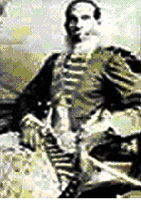The colonial era saw commercial firms being established by British
businessmen who saw opportunities in Sri Lanka – then known as Ceylon. These opportunities arose with the expansion of the plantation sector – first
coffee followed by tea and rubber.
Meanwhile, there were at least a handful of local entrepreneurs who also saw prospects to move into business. Among them was H. Don Carolis & Sons – a name synonymous with
furniture in Sri Lanka.
One of the oldest
companies manufacturing furniture, Don Carolis & Sons recently completed 150 years in business. The company was started on November 19, 1860.
The name of the
company originates from its founder, Mudaliyar Don Carolis Hewavitarne
(1833 – 1906) who hailed from Matara. He was well known as a businessman, industrialist, philanthropist and a pioneer of the Buddhist revival
movement. The business was started when he was
27 years old. At a time when furniture was being imported, he saw an
opportunity in supplying the planters with solid and artistic furniture in the best European styles.
Even at that time Moratuwa, just like today, had a reputation for
carpentry. He picked a small group of carpenters from Moratuwa and started making furniture in a small house at Keyzer Street, Pettah – in the same area were the headoffice of the company still stands.
Records indicate that in 1886 an Australian dealer in horses named Avery introduced Sri Lankan furniture to Australia. In 1895, when an Indo-African syndicate was formed in London to supply
furniture to South Africa, the company had to expand its operations. A bigger workshop was started in Slave Island. The
workforce was increased to around 250. Early
photographs show that the workshop carried the
name-board 'The Ceylon Steam Furniture Works – H. Don Carolis & Sons'.
The timber used
during this time is listed as 'nadun' (Ceylon walnut), satin, ebony, calamander and jak.
With business expansion, the firm's manufacturing methods improved,
combined with novel designs.
At the same time, its reputation spread not only in
Sri Lanka but abroad as well.
By the turn of the
century in addition to Australia and South Africa, its furniture reached India, Burma, England and America.
In the early years, the company premises in Pettah covered an area of nearly three acres. There were three centers each having a showroom
displaying a range of
furniture ranging from
delicately hand-carved cabinets and drawing room suites to plain solid household and office furniture.
After the death of Mudaliyar Don Carolis Hewavitarne, the business was managed by two of his sons – Edmund and Simon.
Both had gone abroad and studied new systems of manufacture as well as commercial and industrial methods in those countries. Apart from furniture other household needs like
crockery, cutlery, carpets, iron beds, spring mattresses, cane and rattan-ware were also introduced.
The high quality of the furniture supplied overseas was well appreciated and Don Carolis products won awards at exhibitions like the Paris Exhibition (1900), the Indian Industrial Exhibition (1901) and the St. Louis Exposition (1904). Prizes were also won regularly at the Ceylon Agricultural Exhibitions.
Timber at that time was transported by carts, rafts or padda boats to the steam mills situated on the banks of the Beira Lake. A 30-horse power steam engine supplied power to the factory which had two sections – one to saw timber and the other to make
furniture.
A large number of boys were taught carpentry free in an industrial school set up by the company. According to early records the employees served for long periods – some as much as thirty years and more – obviously their wages were high and they were well looked after.
The Mudaliyar born and bred in a Buddhist family had his early education at the Raja Maha Vihara at Matara was an expert at astrology and published the first Astronomical Year Book in Sinhala. He was a devoted Buddhist and played a prominent role is establishing the Vidyodaya Pirivena in 1872, for the monks to learn the Dhamma. He supported to maintain the institution throughout his life.
"He was also a
large-hearted, open-handed man, the poor, the sick and the needy finding in him a ready and kindly
benefactor," states the 'Twentieth Century Impressions of Ceylon'.
The last generous act of his life was the setting apart of property worth
Rs. 30,000 – a princely sum in the early 1900s – for the spread of industrial
education in Sri Lanka among Buddhists, by
sending selected young men to Japan to learn Japanese industrial methods.
The great patriot Anagarika Dharmapala was one of his sons. |



